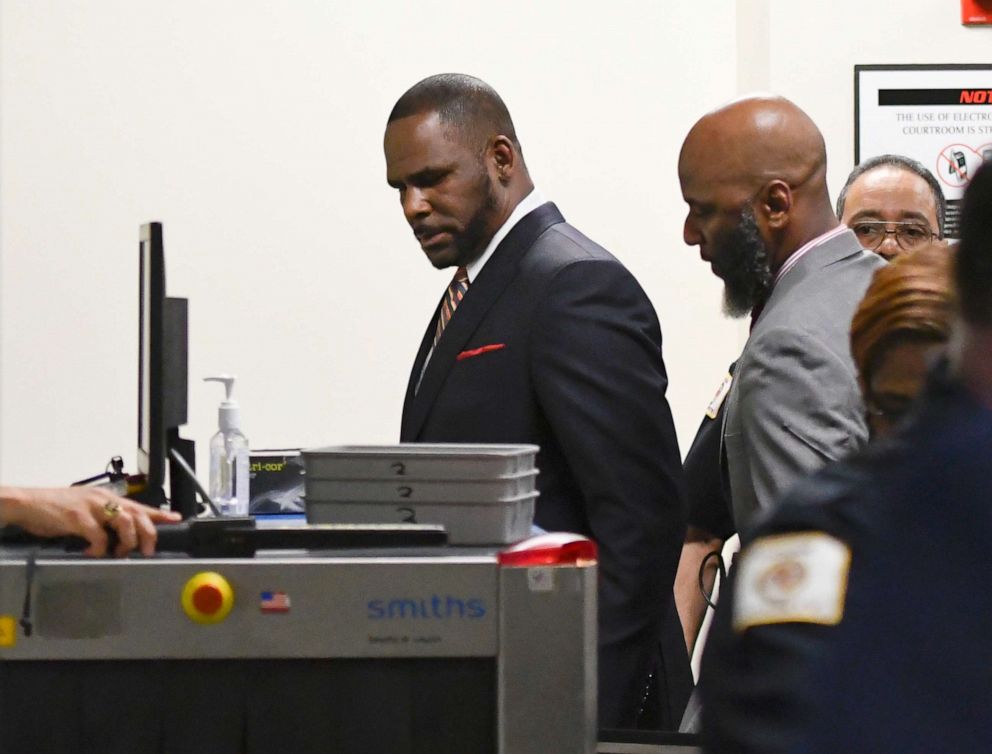R. Kelly hands over $62K child support check, but legal troubles remain
The singer faces more financial challenges as he fights accusations of assault.
R. Kelly presented a $62,000 check to his ex-wife for back child support Wednesday during a Chicago court appearance that the R&B artist hopes will mitigate further legal trouble.
Kelly handed over the check two months after he was arrested and jailed for failing to make the required payments. He was released from jail after a benefactor made a payment on his behalf.
Kelly's court appearance at Wednesday's child support hearing came a day after he appeared in court on unrelated charges of assaulting three underage girls and one woman between 1998 and 2010. Kelly has pleaded not guilty and denies the allegations in that case.
The singer-songwriter made Wednesday's $62,499 payment to cover back child support for the months of March, April and May.
"My client now looks forward to clearing his name and being cleared of all charges in the near future," said Kelly representative Darrell Johnson. "Mr. Kelly also placed a check for child support in escrow with his family law attorney for June, July and August in advance. It will paid be in the next couple of days or on his next meeting on May 14th."
However Kelly's ex-wife Drea Kelly is still seeking $32,383 in back child support remaining from the $161,000 that the judge ordered Kelly to pay in March.
In addition, Drea Kelly is seeking interest for back child support payments and attorney fees, which her attorney told the judge she is entitled to as a means of enforcing past and future payments.

Kelly will also have to answer to his ex-wife's claim that he did not meet his obligation to pay college expenses for their daughter, which forced her to leave school.
The judge previously found Kelly in contempt when he didn't respond to court documents about his failure to meet their original settlement agreement and failed to show up in court on Feb. 6. Kelly is legally obligated to provide payment through his daughter's 23rd birthday, and Drea Kelly is asking that the timetable be extended a year because she missed a year of school due to nonpayment.
The judge ordered Kelly and his ex-wife to set a date to come up with a solution, saying, "My biggest concern is that she should be able to finish school." Kelly's attorney, Steve Greenberg, countered that Drea Kelly had impeded his client's ability to make a living, but the judge retorted: "I wouldn't go down that path."
Drea Kelly spoke up only once in court, to confirm that her daughter has one year of college remaining, should she re-enroll.
Prior to the child support hearing, the judge ruled that the child support case file would be unsealed and open to the public, vacating a 2013 order that sealed the entire record. The ruling followed a motion filed on behalf of media outlets including the Chicago Tribune and a local television station that contended the seal was unlawful.
The case file stretches from 2006 through the present day.
"I believe it was just overly broad," the judge said of the overturned seal, "and we really need to take a look at the documents on a case-by-case basis, because that's what the law says."
Kelly's lawyer objected to the ruling, arguing that Kelly's children were minors at the time and thus deserved to be protected. The attorney also worried that the unsealed documents could find their way into Kelly's criminal case, breaking a "cloak of privacy."
But the judge said she could find no reason that the entire file had been sealed, and also noted that from 2006-2013 there was no seal and the case was available to the public.
The unsealing will only take effect after the parties meet to determine what material, if any, should remain sealed or be redacted, and the judge then rules on the parents' requests.




